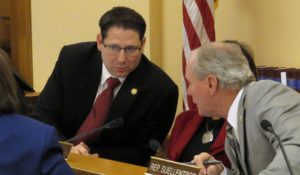 The real work of the special legislative session started in earnest shortly after 9:00 this morning with the convening of a joint meeting of the Senate Ways and Means Committee and the House Appropriations Committee.
The real work of the special legislative session started in earnest shortly after 9:00 this morning with the convening of a joint meeting of the Senate Ways and Means Committee and the House Appropriations Committee.
The meeting was scheduled to hold a joint hearing on two identical bills – Senate Bill 1 and House Bill 2001. These bills contain the school finance equity plan that has been hinted at in the media for the past couple of days.
The Bill provides for $38 million in equity funding and does not have the “hold harmless” provision that jinxed the last bill passed at the end of the regular session.
The most controversial part of this bill is that $13 million of the needed money comes from a 0.5% across the board reduction to all school districts. There are many that believe this provision will hurt the chances of the bill should it come to a review before the Supreme Court. The question is whether the Court will accept a reduction of “adequacy” to solve “equity.”
Immediately after the joint hearing, the Ways and Means Committee met separately to work SB 1. Democratic Senators Laura Kelly and Marci Francisco offered amendments to take the funding cut out and replace it with other sources of revenue but none of those amendments prevailed. In the end, the Committee voted the bill without amendment. It will now be ready for consideration by the full Senate tomorrow.
The House Appropriations Committee met at 2:20 to work HB 2001. While there was a lot of discussion around the funding issue, no amendments were offered and the bill was sent on for consideration by the full House.
The House will go in tomorrow morning at 9:00 and the Senate at 10:00.
We expect both chambers to take up the bills at that time.
Also out there are two new constitutional amendments. One would create a “superior court” changing the way these issues will be decided in the future. The other would cap spending on education at 45% of the state general fund. Constitutional amendments need a supermajority to pass the Legislature and so do not often prevail. When they do pass the Legislature, they are then subject to a vote of the people.


